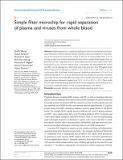| dc.contributor.author | Wang, ShuQi | |
| dc.contributor.author | Sarenac, Dusan | |
| dc.contributor.author | Chen, Michael H. | |
| dc.contributor.author | Huang, Shih-Han | |
| dc.contributor.author | Giguel, Francoise F. | |
| dc.contributor.author | Kuritzkes, Daniel R. | |
| dc.contributor.author | Demirci, Utkan | |
| dc.date.accessioned | 2014-07-01T13:02:56Z | |
| dc.date.available | 2014-07-01T13:02:56Z | |
| dc.date.issued | 2012-09 | |
| dc.date.submitted | 2012-04 | |
| dc.identifier.issn | 1178-2013 | |
| dc.identifier.issn | 1176-9114 | |
| dc.identifier.uri | http://hdl.handle.net/1721.1/88156 | |
| dc.description.abstract | Sample preparation is a significant challenge for detection and sensing technologies, since the presence of blood cells can interfere with the accuracy and reliability of virus detection at the nanoscale for point-of-care testing. To the best of our knowledge, there is not an existing on-chip virus isolation technology that does not use complex fluidic pumps. Here, we presented a lab-on-a-chip filter device to isolate plasma and viruses from unprocessed whole blood based on size exclusion without using a micropump. We demonstrated that viruses (eg, HIV) can be separated on a filter-based chip (2-µm pore size) from HIV-spiked whole blood at high recovery efficiencies of 89.9% ± 5.0%, 80.5% ± 4.3%, and 78.2% ± 3.8%, for viral loads of 1000, 10,000 and 100,000 copies/mL, respectively. Meanwhile, 81.7% ± 6.7% of red blood cells and 89.5% ± 2.4% of white blood cells were retained on 2 µm pore–sized filter microchips. We also tested these filter microchips with seven HIV-infected patient samples and observed recovery efficiencies ranging from 73.1% ± 8.3% to 82.5% ± 4.1%. These results are first steps towards developing disposable point-of-care diagnostics and monitoring devices for resource-constrained settings, as well as hospital and primary care settings. | en_US |
| dc.description.sponsorship | National Institutes of Health (U.S.) (NIH R01 A1081534) | en_US |
| dc.description.sponsorship | National Institutes of Health (U.S.) (NIH R01-A1093282) | en_US |
| dc.description.sponsorship | National Institutes of Health (U.S.) (R21 AI087107) | en_US |
| dc.description.sponsorship | National Institutes of Health (U.S.) (NIH U54EB015408) | en_US |
| dc.description.sponsorship | National Institutes of Health (U.S.) (R21 HL095960) | en_US |
| dc.description.sponsorship | United States. Army Medical Research and Materiel Command | en_US |
| dc.description.sponsorship | United States. Army. Telemedicine and Advanced Technology Research Center | en_US |
| dc.language.iso | en_US | |
| dc.publisher | Dove Medical Press | en_US |
| dc.relation.isversionof | http://dx.doi.org/10.2147/ijn.s32579 | en_US |
| dc.rights | Creative Commons Attribution-Noncommercial | en_US |
| dc.rights.uri | http://creativecommons.org/licenses/by-nc/3.0/ | en_US |
| dc.source | Dove Medical Press | en_US |
| dc.title | Simple filter microchip for rapid separation of plasma and viruses from whole blood | en_US |
| dc.type | Article | en_US |
| dc.identifier.citation | Wang, ShuQi, Dusan Sarenac, Michael H. Chen, Shih-Han Huang, Francoise F. Giguel, Daniel R. Kuritzkes, and Utkan Demirci. “Simple Filter Microchip for Rapid Separation of Plasma and Viruses from Whole Blood.” International Journal of Nanomedicine (September 2012): 5019. | en_US |
| dc.contributor.department | Harvard University--MIT Division of Health Sciences and Technology | en_US |
| dc.contributor.mitauthor | Demirci, Utkan | en_US |
| dc.relation.journal | International Journal of Nanomedicine | en_US |
| dc.eprint.version | Final published version | en_US |
| dc.type.uri | http://purl.org/eprint/type/JournalArticle | en_US |
| eprint.status | http://purl.org/eprint/status/PeerReviewed | en_US |
| dspace.orderedauthors | Wang, ShuQi; Sarenac, Dusan; Chen, Michael H.; Huang, Shih-Han; Giguel, Francoise F.; Kuritzkes, Daniel R.; Demirci, Utkan | en_US |
| mit.license | PUBLISHER_CC | en_US |
| mit.metadata.status | Complete | |
